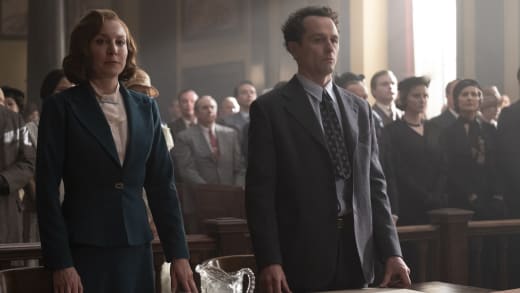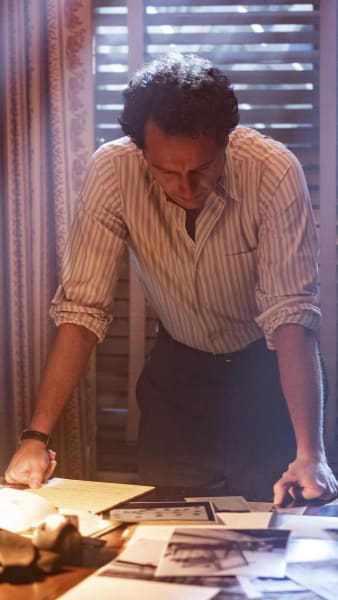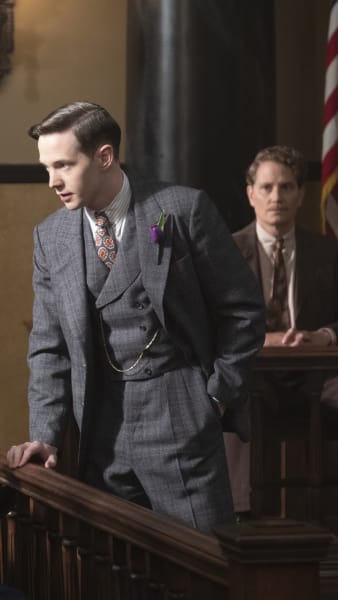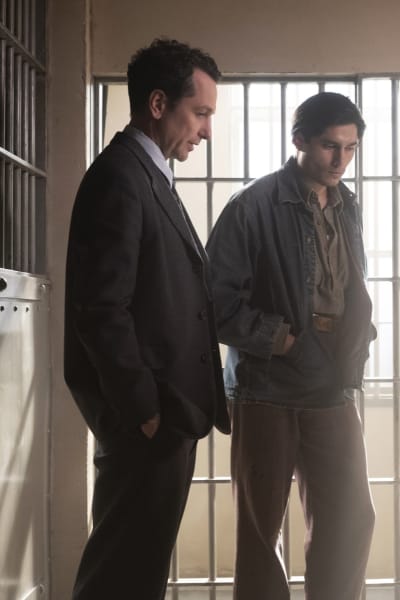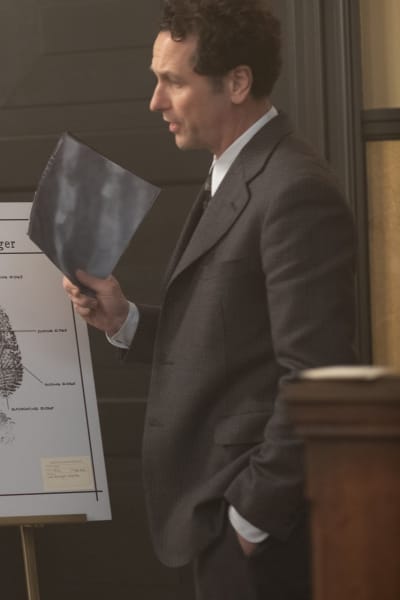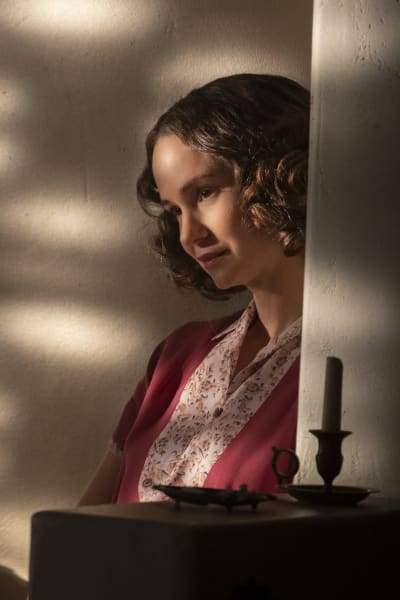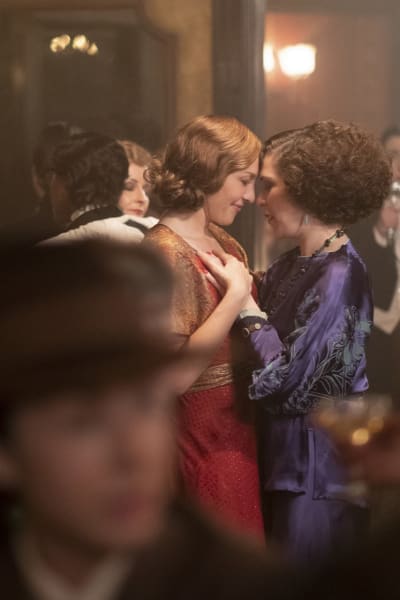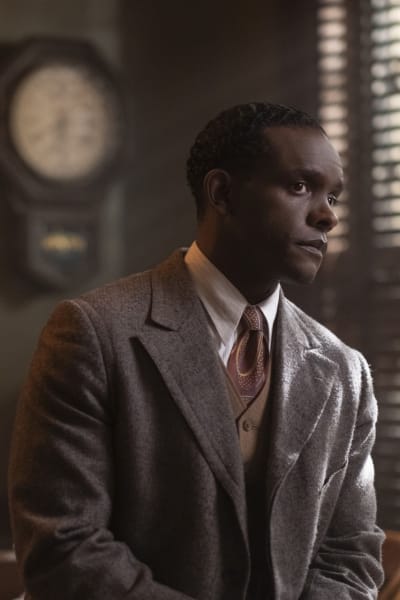This is now shaping up to be the Perry Mason we know.
The Gallardo brothers’ trial commenced on Perry Mason Season 2 Episode 5, with the prosecution and defense making their opening statements, and each went in for the kill.
A central element of Perry Mason is the courtroom sessions, where each is a mindblowing moment as hidden truths come to light.
Both sides, armed with their strategy, argued their case. The strategy each used was the only card they had under their sleeves.
For the prosecution, it was painting Brooks as an important community member who the savages had killed. For the defense, it was to show Brooks’ hidden side and why there must have been other people with a motive to kill him.
This trial was already peculiar due to the race dynamics involved but became even more sensational when the media got involved.
There is always much noise surrounding the media, and it is painted as a unique problem of our times, but the media has been manipulated for as long as people knew how to write lies.
Lydell had employed the use of a prominent media figure to assassinate Perry’s character, but this was something that could backfire. It gave a strong sense of deja vu to see a man who had no information about the case breathe lies into a microphone as if he was speaking God’s truth. I wonder where we see that.
Join us for another hour of truth and justice. As the most important trial our city has seen in a great while commences, I ask you this; why is it only the witnesses tell the whole truth? Why is the same oath not administered to the attorneys?
Frank Finnity
Thomas’ zeal in prosecuting this case always appeared odd, and I’d figured it was because he wanted to impress his boss. However, even after Hamilton decided to offer the brothers a deal, he seemed utterly dissatisfied.
I attributed that to the fact that he might have been racist and wanted to rid the city of brown people one incarceration at a time but after a plan he made with Pete, he seemed to have his skin in the game.
He stood to lose something personal if the Gallardos didn’t end up on the gallows. There definitely was a story there, and it will be damaging when it comes out.
Perry: What is all this? Because up until today, you were hung up on my guys, and suddenly you’re the prince of mercy?
Thomas: You don’t like the deal, you can let the train go by and take the chances on foot.
He was right that despite everyone going through hardship, they don’t result in killing people, whether as a robbery or murder-for-hire.
It all made sense when Rafael recounted the events of the night his sister died. They could have killed him for free, but if they were getting paid for it, even more reason. One can’t begin to imagine the pain he carries. The scars on his neck constantly reminded him of what he had lost.
In their pursuit to dominate the city, the McCutcheons caused more damage than they could have known.
Progress is always good, but it becomes vain when you make people suffer.
Getting offered the deal by a shaken Harrison confirmed something to Perry and the team. Someone else was behind the murder of Brooks, and they were working hard to ensure the truth didn’t come out. How they got to Harrison remains a mystery, but if we were to take a guess, it’s possible threats because of his sexual orientation.
Team Perry secured a win in court after they did something wild. Fingerprint science was still new then, but it has been tried and tested over time, and we know it’s reliable, so when Perry started to cross-examine the expert, it appeared like he was playing a losing game.
Perry: Mr. Barson, is it possible that the defendant could place their own fingerprint backward?
Mr. Barson: No, it’s not possible naturally.
Perry: Then only someone who had taken his fingerprint tried to transfer it could so that it would produce a mirror image, am I correct?
Mr. Barson: Yes.
Perry: Someone like the police or Mr. Milligan’s investigators.
Perry’s significant advantage, in this case, is that he doesn’t bear the burden of proof. He just needs to instill doubt in one juror every time the prosecution presents an argument or a witness.
After the explosive court session, the case became personal.
One of the best ways to discredit someone in a court of law is to question their character. Lydell attempted that by having the radio host question the integrity of the defense counsel, but that was just shooting in the dark.
To find something tangible and incriminating would be better.
Perry and the team had a working theory about who might have ordered the hit, and a councilman emerged on top. To find evidence, Paul came face to face with the man he had been tasked to photograph and had since learned that he’d been used to destroy a powerful black man.
He’d been beating himself up about it for a while until he saw the man’s true colors. It is safe to assume that those sympathies went out the window after the animal came out. He made Paul do things he’d never thought he would do.
The person who ordered the hit on Brooks started tailing Team Perry hoping to find something to hold over them, and oh, was he just lucky.
Perry was in a sexual relationship with his son’s teacher which, according to the morals of the 1930s, was a huge no-no. Information like that coming out would do damage to his character.
An even bigger scandal would be to be in a same-sex relationship. Someone tailed Della and Anita to a lesbian bar. That’s not good.
Anita: Oh, I almost forgot.
Della: What?
Anita: I love you too.
Elsewhere, Paul might have killed a man.
It wouldn’t be hard to assassinate their character in court and ruin their lives while at it.
“Part Thirteen” was everything we had been waiting for. It was dramatic, entertaining, and progressed the story.
What did you think?
Will their secrets be damaging to them?
What was stolen from Perry’s house?
The Gallardo brothers did commit murder, and if justice is served, they must serve some jail time. What do you think is the appropriate time, all things considered?
Let us know in the comments section.
Denis Kimathi is a staff writer for TV Fanatic. He has watched more dramas and comedies than he cares to remember. Catch him on social media obsessing over [excellent] past, current, and upcoming shows or going off about the politics of representation on TV. Follow him on Twitter.


